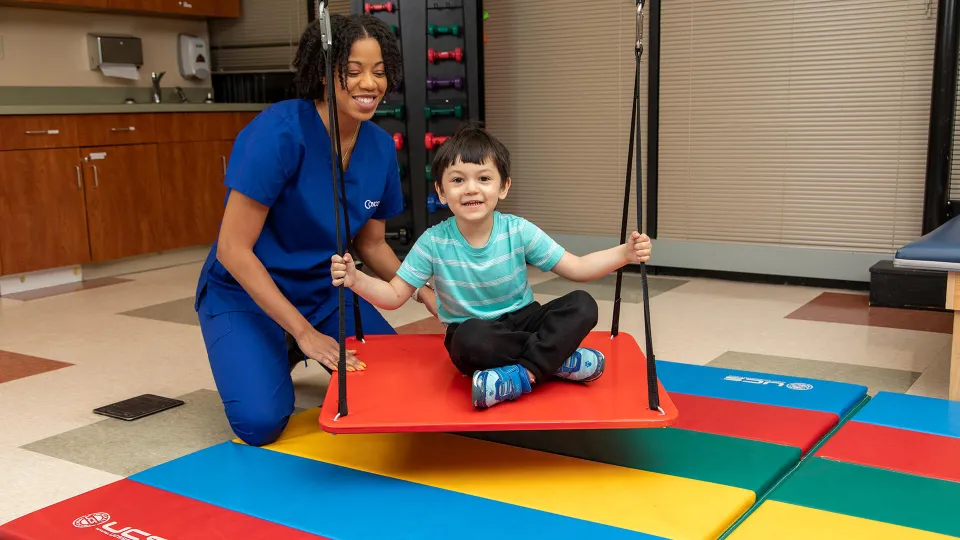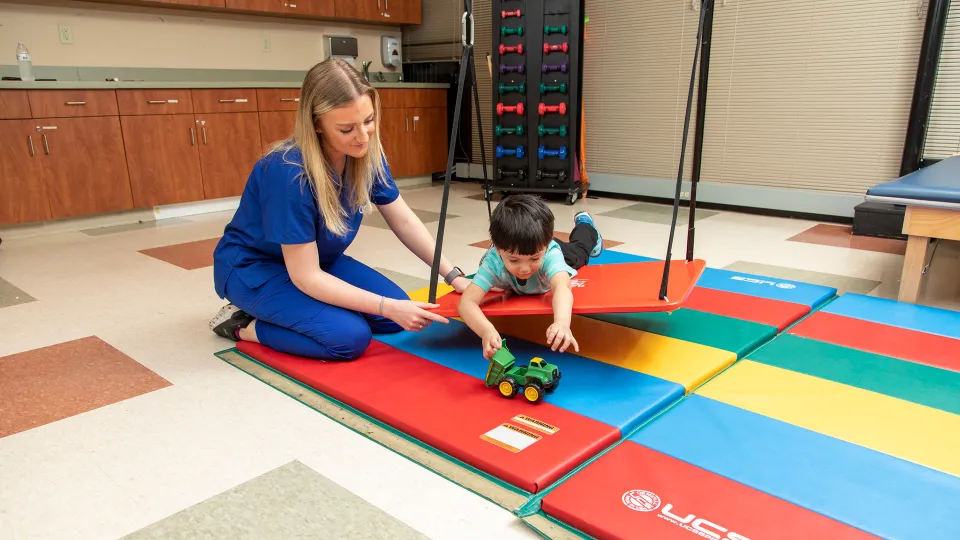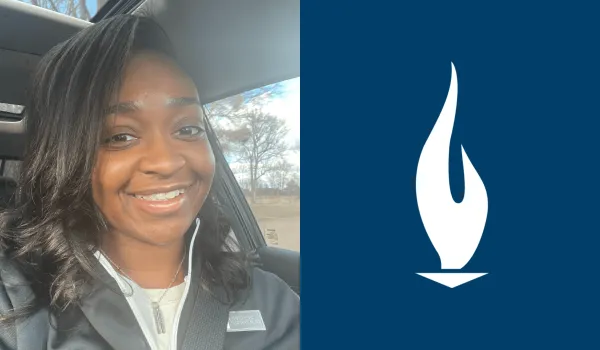
April is the 44th annual Occupational Therapy Month, a time when we get a chance to recognize the efforts of those who are in the occupational therapy field whether you're an occupational therapist or an occupational therapist assistant.
Occupational Therapy Month started in 1980 and corresponds with AOTA's (The American Occupational Therapy Association) Annual Conference & Expo. The 2024 AOTA conference was held March 21st-23rd in Orlando, FL. The 2025 AOTA conference will be held April 3rd-5th in Philadelphia, PA and early registration will be available this fall.
What is Occupational Therapy?

What Does an Occupational Therapy Assistant Do?
Occupational Therapy is a vital profession that helps people across the lifespan to do the things they want and need to do through the therapeutic use of daily activities (occupations). Occupational Therapy practitioners enable people of all ages to live life to its fullest by helping them promote health, and prevent- or live better with- injury, illness, or disability.
Common Occupational Therapy interventions include helping children with disabilities to participate fully in school and social situations, helping people recovering from an injury to regain skills, and providing support for older adults experiencing physical and cognitive changes.
Occupational Therapy services typically include:
- an individualized evaluation, during which the client/family and occupational therapist determine the person's goals
- customized intervention to improve the person's ability to perform daily activities and reach the goals, and
- an outcomes evaluation to ensure that the goals are being met and/or make changes to the intervention plan.
Occupational therapy practitioners have a holistic perspective, in which the focus is adapting the environment and/or task to fit the person, and the person is an integral part of the therapy team.
When Is Occupational Therapy Month?
Occupational Therapy Month occurs each April to honor the dedicated healthcare professionals who play a significant role in people's lives through their work as occupational therapists and occupational therapy assistants. OTs and OTAs help patients of all ages overcome challenges due to emotional, physical, or cognitive issues. During April, it's important to recognize the contributions of these healthcare professionals and their dedication to improvements and changes that benefit their patients and communities.
Importance of Occupational Therapy Month
For many OTs and OTAs, occupational therapy is not just a career but a calling. Whether it's supporting a patient recovering from surgery or a stroke, occupational therapy is a vital part of many patients' health treatment plans. National Occupational Therapy Month serves as a reminder of the contributions these professionals make to healthcare.
History and Evolution of Occupational Therapy Month
The American Occupational Therapy Association initiated Occupational Therapy Month in 1980 during an annual conference and expo. The origins of this profession as a modern practice go back a century, with the first mention of this approach to well-being dating to 100 B.C. as a way to treat mental or emotional disorders. OT has evolved and follows strict AOTA protocols for practicing healthcare professionals.
Ways To Celebrate Occupational Therapy Month
Get into the festivities and honor occupational therapy professionals around the U.S. with these fun ideas to celebrate Occupational Therapy Month in April:
Educate and Build Awareness
Share information and awareness about the profession, how it helps patients and supports an overall treatment plan for health and wellness. Consider sharing success stories with coworkers and friends or resources for those not in the profession to build support and appreciation for OT. You might also educate your networks on social media about National Occupational Therapy Month and its importance to you and those in the field.
Show Recognition to OTs and OTAs
If you're not an OT or OTA but know someone who is, be sure to thank them or recognize their contributions to the profession and the health outcomes of their patients. Their work is vital as part of a broader health plan for many recovering patients, and a simple message of thanks to show your gratitude can go a long way.
Attend Workshops or Seminars
Participate in workshops, seminars, or conferences that showcase occupational therapy or occupational therapy assistant programs and topics. If you're entering this career, these events can benefit your professional development. You may also find online events that promote and educate people about occupational therapy, such as webinars, podcasts, and short videos.
Advocate for Access to Occupational Therapy
One of the best ways to celebrate is to advocate for others. Access to occupational therapy and other healthcare resources is sometimes challenging. Consider advocating for policies that support greater access to these services and raising awareness about the importance of early intervention for patients seeking OT resources.
Occupational therapy is a necessary component of many patients' healthcare treatments. By celebrating in April, you can show these professionals you're aware of the commitment and effort necessary to be effective therapists. With some of these ideas, you can support OTs and OTAs by recognizing their hard work and dedication in this healthcare field.
Exciting Opportunities for Occupational Therapy

Where Do Occupational Therapy Assistants Work?
In 2017, Occupational Therapy celebrated 100 years as a profession. After 100 years, the new century has brought some great new opportunities to the profession. During the 100th celebration, some of the 100 most influential people in OT talked about OT's biggest opportunities.
"I think this has to be one of the most exciting times for occupational therapy," says Janice Burke, co-founder of the Model of Human Occupation. "The big picture today is on health and wellness, and that is what occupational therapy has always been about. For OT, the opportunities are boundless. We can fit everywhere and anywhere- traditional health settings, community, and individual-based [practice]."
Mary Beth Early sees an array of opportunities for occupational therapy: ergonomics; body mechanics; and habit development regarding technology, screen time, positioning, posture, and social behavior. She also sees providing intervention for emotional regulation and behavioral health for victims of trauma, persons with mental disorders, and persons in recovery as an area of opportunity for occupational therapy.
"This is an opportunity for us (with more practitioners, educators, and researchers) to share our story, our science, and our discipline," says Thom Fisher. "Being bold and intentional can allow the public to understand what OTs and OTAs bring to the table with client care."
Charles Christiansen was drawn to occupational therapy by "its optimistic view of human possibility and its traditions as a client-centered, authentic, and activity-related" profession.
"In this new age fueled by abundant information and rapidly evolving digital technologies, it is likely that new medical and rehabilitation technologies will change the nature of the health problems that health practitioners face," says Christiansen. "We can expect that novel technologies will either prevent or remedy chronic conditions or reduce the consequences of disabilities (consider mobility exoskeletons, sensory-neural implants, self-driving cars, and personal assistant robotics). These 'game-changing' advances will change the current nature of occupational therapy practice dramatically."
Starting Your OTA Career

How To Become an Occupational Therapy Assistant
If the idea of helping others live their daily lives to the fullest is intriguing to you, a career in OT might be in your future. At Concorde Career College, we offer an Occupational Therapy Assistant training program that may be completed in as few as 20 months. To learn more about our OTA or other hands-on healthcare career training programs, contact your Concorde Admissions office today! While you're at it, be sure to show your support for OT by using #OTMonth.
Occupational Therapy Month, American Occupational Therapy Association, https://www.aota.org/events/calendar/ot-month
Occupational Therapy Month - April 2024, National Today, https://nationaltoday.com/occupational-therapy-month/
Take The Next Step Towards a Brighter Future
Interested in learning more about our Occupational Therapy Assistant program?
We have a Concorde representative ready to talk about what matters most to you. Get answers about start dates, curriculum, financial aid, scholarships and more!







